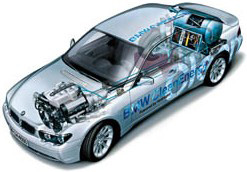Hydrogen Internal Combustion Engine Vehicles
Hydrogen internal combustion engine (HICE) vehicles are an exciting lower cost alternative to fuel cell vehicles. Like fuel cell vehicles, HICE vehicles enable zero or near zero emission transportation by using clean hydrogen fuel, but HICE vehicles utilize modified internal combustion engines to generate electric power instead of fuel cells.
Ford and BMW are among current manufacturers of hydrogen-burning engines.
Gaseous hydrogen is injected into the engine, which then burns the hydrogen fuel much as it would burn gasoline for combustion. The engine is fueled by compressed hydrogen gas, stored in high-pressure tanks carried by the vehicle. To refuel, the vehicle must be driven to a specialized hydrogen refueling station, capable of dispensing high-pressure hydrogen into the vehicle’s tanks.
 |
BMW hydrogen-powered
concept car. |
By using hydrogen as a fuel, greenhouse gases (carbon monoxide and carbon dioxide) are almost completely eliminated in HICE vehicles. Future improvements may also reduce the small amounts of oxides of nitrogen (NOx) produced by HICE engines to near-zero levels. The HICE system also eliminates particulate matter – a dangerous byproduct of both diesel and natural gas engines. HICE therefore provides 99% of the emission reduction benefits of a fuel cell system at a fraction of the cost.
There are two types of hydrogen internal combustion engine vehicles: conventionally-driven HICE vehicles and hybrid HICE vehicles. In conventionally-driven HICE vehicles, the hydrogen-burning engine mechanically drives the vehicle’s wheels, just as engines using gasoline or other fuels operate in conventional vehicles. In hybrid HICE vehicles, the hydrogen engine is used to run an electric generator, in a similar manner to series hybrid drive systems operating on other fuels. Power from the electric generator is then used to drive the vehicle’s wheels, and is generally augmented by power from a battery or ultracapacitor pack.
While no HICE vehicles are yet in mass production, several models have been demonstrated and a select few, specially-modified HICE vehicles are commercially available. Conventionally-driven HICE systems are being used in small numbers of concept cars, such as the 745h, BMW’s latest hydrogen-powered automobile. However, BMW is not offering a hydrogen-powered car for general sale, nor are any other major auto manufacturers. This niche is being filled by much smaller companies, such as Quantum Fuel Systems, which offers a version of the Toyota Prius modified to run on a combination of hydrogen and battery power. Still smaller companies, such as Intergalactic Hydrogen and Hydrogen Car Company, have plans to offer hydrogen-powered cars on a commercial scale, but are not yet there.
|
| New Flyer 40-foot bus powered by ISE hybrid hydrogen internal combustion engine (HICE) system |
In the realm of larger vehicles, ISE Corporation has demonstrated a prototype hybrid HICE transit bus that gets about twice the fuel economy of conventional buses using compressed natural gas. ISE’s hybrid HICE system uses a Ford 6.8 liter V10 engine modified to burn hydrogen and hydrogen storage tanks mounted on the roof of the bus. Otherwise, the ISE HICE drive system is nearly identical to the gasoline and diesel hybrid systems ISE is selling commercially to transit operators across the country. While a HICE bus costs 2-3 times the cost of a conventional bus, U.S. transit operators are eligible to have up to 90% of the cost difference subsidized by the federal government.
TransPower offers expertise and access to the leading suppliers of hydrogen internal combustion engine transportation solutions. We believe there is particular promise in the emergence of the hybrid HICE technology, as evidenced by the performance of the ISE hybrid HICE bus. In addition to providing HICE-related expertise and products, TransPower can assist client-partners in selecting or designing the right electric drive system to take advantage of advances in HICE technology. In HICE vehicles, electric motors, hydrogen storage, and vehicle and fuel cell control systems are vital to safe, reliable operation. TransPower’s Preferred Supplier Network includes the leading suppliers of electric drive motors, controllers, and fuel cell-related products for vehicle applications. TransPower is ready to help you decide if HICE technology can be used in your vehicle fleet, and can assist you in your search for government funding to help finance fuel cell vehicle acquisitions. |